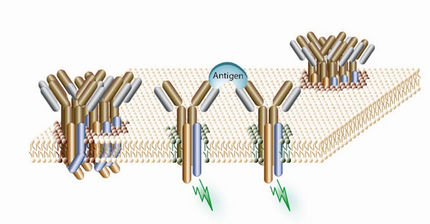Avidex technology yields novel immunotherapeutic protein platform
Advertisement
Avidex announced publication of data that for the first time demonstrates that soluble, high affinity, human monoclonal T cell receptors (mTCRs) can be selected using phage display technology. This is a breakthrough that paves the way for the development of new immunotherapeutics based on the T cell immune response which has so far been largely unexplored.
Mr James Noble, CEO of Avidex commented: "This is an amazing achievement for a small biotech company given the enormous technical hurdles. Avidex can routinely produce high affinity mTCRs and is developing a new protein therapeutic platform based on phage display. Companies like Cambridge Antibody Technology, Dyax and Morphosys all started out with such platforms but on the antibody side. Avidex is the only company worldwide that produces naturally folded, soluble and now high affinity human mTCRs using phage display. This opens up significant new avenues for immunotherapy for the treatment of major diseases such as autoimmune diseases, viral diseases and cancer."
T cell receptors, like antibodies, have long been recognised as attractive as possible therapeutics as they are used by the immune system to recognise abnormal body cells, for example cancer cells or cells infected by virus. There are now more than 12 monoclonal antibody products registered as drugs and over 200 are in clinical trials. Until now, however, attempts to isolate and produce soluble, stable and high affinity TCRs for the use in antibody-like products have not been successful and this has hampered the development of TCRs for therapeutic uses.
The T cell mediated immune response is triggered by the highly specific interaction between TCRs and the 'peptide antigen', a structure at the surface of the antigen-presenting cell (APC) that combines the antigen and the HLA complex (human leukocyte antigen). Peptide antigens play a key role in the onset of many diseases and represent the most comprehensive range of potential therapeutic targets including intracellular, cell-surface-expressed or secreted targets.
Originalveröffentlichung: Y. Li, R. Moysey, P. Molloy, A.-L. Vuidepot, T. Mahon, E. Batson, S. Dunn, N. Liddy, P. Rizkallah, M. Sami, P. Todorov, J. Jacob, B. K. Jackobsen, J. M. Boutler; "'Directed evolution of human T cell receptors with picomolar affinities by phage display", Nature Biotechnology 2005.
Other news from the department research and development
Most read news
More news from our other portals
See the theme worlds for related content
Topic world Antibodies
Antibodies are specialized molecules of our immune system that can specifically recognize and neutralize pathogens or foreign substances. Antibody research in biotech and pharma has recognized this natural defense potential and is working intensively to make it therapeutically useful. From monoclonal antibodies used against cancer or autoimmune diseases to antibody-drug conjugates that specifically transport drugs to disease cells - the possibilities are enormous

Topic world Antibodies
Antibodies are specialized molecules of our immune system that can specifically recognize and neutralize pathogens or foreign substances. Antibody research in biotech and pharma has recognized this natural defense potential and is working intensively to make it therapeutically useful. From monoclonal antibodies used against cancer or autoimmune diseases to antibody-drug conjugates that specifically transport drugs to disease cells - the possibilities are enormous




























































